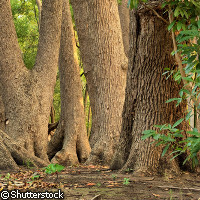African forests buffering climate change, but for how long?
An international group of researchers has found that tropical trees in undisturbed forests are storing some 20% of carbon dioxide (CO2), turning them into a global carbon sink. Tropical forests hold more carbon per unit area than any other type of land cover. Growing trees take up carbon from the atmosphere that is released from burning fossil fuels. But when the trees fall, because of either natural or man-made disasters, the carbon is released back into the atmosphere. The findings of the 40-year study were published in the latest edition of the journal Nature. The research focused on tropical forests in Africa, which is home to around 33% of the Earth's tropical forests. The scientists found that these forests absorb more than one billion tonnes of CO2 each year and over the past few decades each hectare of intact African forest has absorbed an additional 0.6 tonnes of carbon annually. Overall, the remaining global tropical forests, including the African carbon sink, soak up a whopping 4.8 billion tonnes of CO2 each year. 'We are receiving a free subsidy from nature,' explains Dr Simon Lewis, a Royal Society research fellow at the University of Leeds in the UK and lead author of the paper. 'Tropical forest trees are absorbing about 18% of the CO2 added to the atmosphere each year from burning fossil fuels, substantially buffering the rate of climate change.' By assessing the latest data with results found in past Asian and South American studies (a total of 250,000 tree records), the scientists have gained a better understanding of the link between the remaining undisturbed forests and the absorption of carbon. The scientists studied 79 land plots in apparently-mature closed-canopy forests in 10 African countries. The diameters of all trees above a certain size were measured by using standardised methods within each area at least twice and at least two years apart. The results showed that the trees are increasing in size and CO2 absorption rates are also going up. However, it remains a mystery as to why the trees are growing bigger and absorbing carbon, the scientists said. The extra CO2 found in the atmosphere may be the culprit as it may be acting like a fertiliser. 'Whatever the cause, we cannot rely on this sink forever,' Dr Lewis cautions. 'Even if we preserve all remaining tropical forest, these trees will not continue getting bigger indefinitely.' According to the Intergovernmental Panel on Climate Change, 32 billion tonnes of CO2 are released every year and around half of that remains in the atmosphere. So where is the other half going? 'It's well known that about half of the "missing" carbon is being dissolved into the oceans, and the other half is going somewhere on land in vegetation and soils, but we were not sure precisely where,' Dr Lewis comments. 'According to our study, about half the total carbon "land sink" is in tropical forest trees.' For his part, Dr Lee White, Chief Climate Change Scientist in Gabon, said: 'To get an idea of the value of the sink, the removal of nearly 5 billion tonnes of CO2 from the atmosphere by intact tropical forests, based on realistic prices for 1 tonne of carbon, should be valued at around GBP 13 billion [EUR 14.7 billion] per year.' The co-author of the study underlined that 'this is a compelling argument for conserving tropical forests'. Dr Lewis goes on to say that the countries largely wreaking havoc on the climate should 'be transferring substantial resources to countries with tropical forests to reduce deforestation rates and promote alternative development pathways'. Furthermore, the scientists say more research is needed to determine how the growing rainforest trees are affecting the lives of species making their homes there. The results of this study come at an opportune time, particularly because global leaders will meet at the UN Climate Change Conference in Copenhagen, Denmark from 7 to 18 December 2009 to resolve a number of issues like deciding on new climate change targets and forging new international agreements to stop deforestation.



